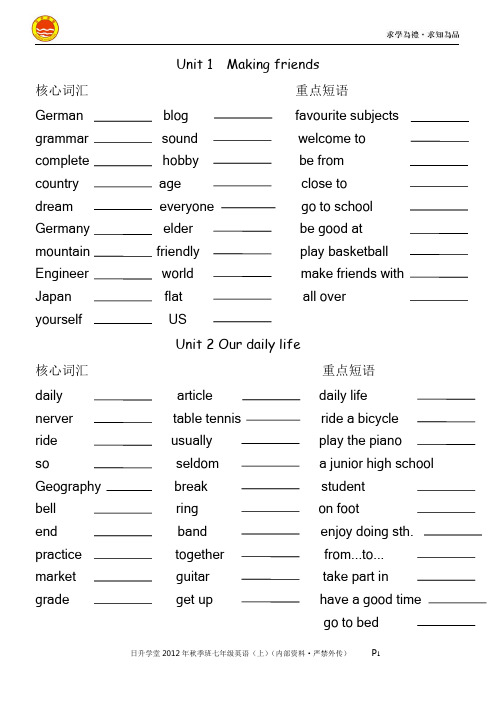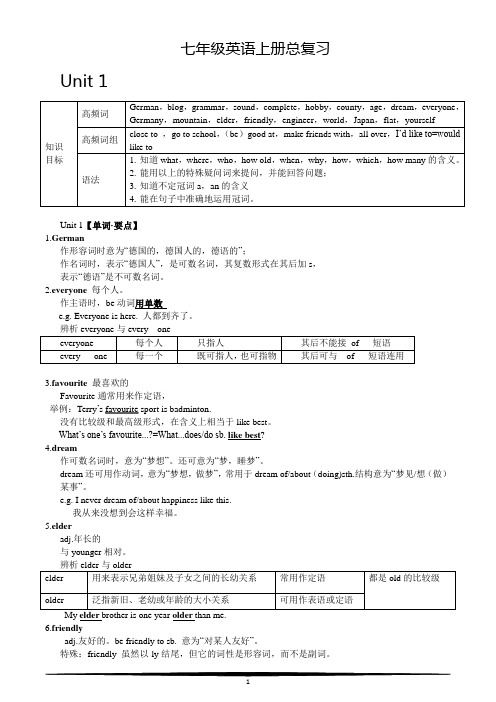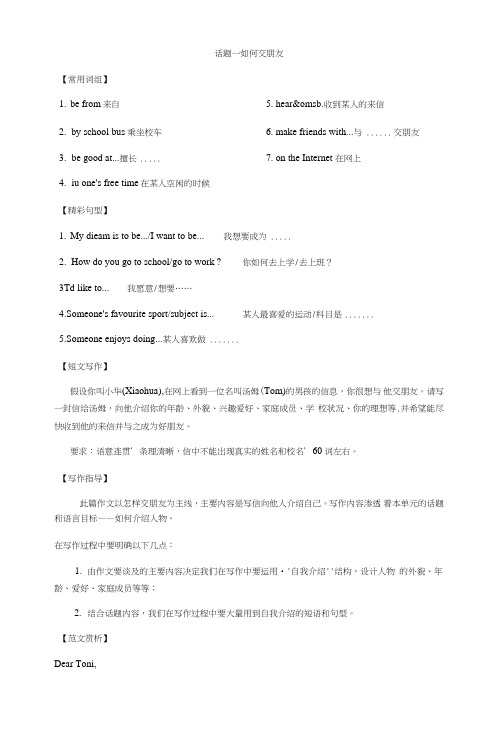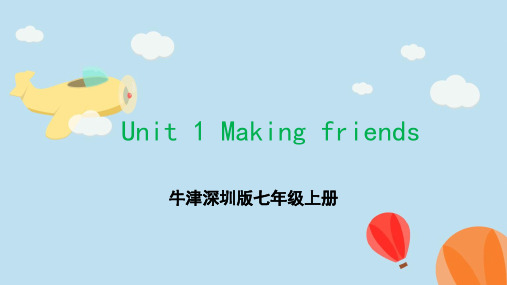广州深圳版七年级英语上册期末总复习
- 格式:docx
- 大小:151.11 KB
- 文档页数:40

期末复习第一节音标辨别。
找出划线部分与所给音标发音相同的单词。
1. [i:] A. Chinese B. friendly C. enjoy D. shine2. [s] A. use B. beaches C. makes D. loves3. [au] A. launch B. fountain C. country D. nervous4. [au] A. without B. blow C. so D. nervous5. [i:] A. dream B. seldom C. bell D. spend6. [au] A. show B. mountain C. own D. snow7. fi:l A. weak B. if C. inside D. kick8. [au] A.know B. snowy C. amount D. trouble9. [s] A. runs B. finishes C. hopes D. says10. [s] A. catches B. buys C. carries D. kicks II. [z] A. enjoys B.speaks C. laughs D. washes12. [s] A. glasses B. changes C. helps D. gives13. [t] A. wanted B. needed C. helped D. mended14. [d] A. surfed B. hurried C. rushed D. reached15. [id] A.added B. picked C. stopped D. lived16. [i:] A. practice B. breathe C. provide D. ride17. [id] A. returned B. visited C. carried D. climbed 第二节重音辨别。

Unit 1 Making friends核心词汇重点短语German blog favourite subjects grammar sound welcome tocomplete hobby be fromcountry age close todream everyone go to school Germany elder be good atmountain friendly play basketball Engineer world make friends with Japan flat all overyourself USUnit 2 Our daily life核心词汇重点短语daily article daily lifenerver table tennis ride a bicycleride usually play the pianoso seldom a junior high school Geography break studentbell ring on footend band enjoy doing sth. practice together from...to... market guitar take part ingrade get up have a good timego to bedUnit 3 The Earth核心词汇重点短语Earth quiz protect the Earth pattern protect provide...with report part make energy land field put...intolarge provide stop doing sth. pollution burn throw away energy polluteground killimportant factkilometre owncatch problemUnit 4 Seasons核心词汇重点短语Australia footprint take a tripwet kick go on a picnic town blow make a snowmen everything trip fly kitesshine brightly go swimming picnic dry have a picnic snowy spendrelative duringgrandparentsUnit5 Visiting the Moon核心词汇重点短语diary space more than spaceship spacesuit (be) able to nervous leave have togravity able so thatfloat tie take photo ourselves without as...as...weak breathe that isif camera such aswork gardenrock postcardmachine returnUnit6 Travelling around Asia核心词汇重点短语Asia guide travel guidearea traditional place of interest modern sightseeing in the centre of centre fountain light upbuilding just in the north-west of across lightdirection naturalbeauty bridgePond snakeoutside dumplingtempleUnit 7 School clubs核心词汇重点短语Fair rocket learn about power attend all the way teach disappear of course surprised another remote control amazing skill look upboring headinginformation antbutterfly beerecentUnit 8 Collecting things核心词汇重点短语unusual interview living room model stamp (be) bad for doorbell front (be) interested in silver push work of art soon grandsongranddaughter newspaperinside everywherefollow hardlyspace freeshould sentencemagazine somethingreally anythingago UK over。

七年级英语上册总复习Unit 1Unit 1【单词·要点】 1.German作形容词时意为“德国的,德国人的,德语的”;作名词时,表示“德国人”,是可数名词,其复数形式在其后加s , 表示“德语”是不可数名词。
2.everyone 每个人。
作主语时,be 动词用单数e.g. Everyone is here. 人都到齐了。
3.favourite 最喜欢的Favourite通常用来作定语,举例:Terry ’s favourite sport is badminton.没有比较级和最高级形式,在含义上相当于like best 。
What’s one’s favourite...?=What...does/do sb. like best ? 4.dream作可数名词时,意为“梦想”。
还可意为“梦,睡梦”。
dream 还可用作动词,意为“梦想,做梦”,常用于dream of/about (doing)sth.结构意为“梦见/想(做)某事”。
e.g. I never dream of/about happiness like this. 我从来没想到会这样幸福。
5.elderadj.年长的与younger 相对。
My elder brother is one year older than me. 6.friendlyadj.友好的。
be friendly to sb. 意为“对某人友好”。
特殊:friendly 虽然以-ly 结尾,但它的词性是形容词,而不是副词。
类似的形容词还有:lovely可爱的lonely 孤独的lively 生动的ugly丑的silly 傻的daily 每日的7.manyadj.许多的;也可作代词,意为“许多”。
e.g. There are many students in the school yard.在校园里有许多学生。
e.g. Many of us think so.我们中有很多人这样认为。


话题三如何保护环境【常用词组】1.save the energy节约能源2.pollute the air污染空气3.stop doing sth.停止做某事e...instead of...用……取代……5.provide...with...为……提供……6.make the Earth better让地球变得更好7.for our future为了我们的将来8.live better生活得更好9.as we all know众所周知【精彩句型】1.A good environment provides us with clean air.一个好的环境能为我们提供清新的空气。
2.A lot of pollution comes from...很多污染来自……3.It’s everyone’s duty to protect...保护……是每个人的责任。
4.Good environment keeps us live better.好的环境让我们生活得更美好。
5.We should try our best to stop polluting...我们应该尽最大的努力停止对……的污染。
【短文写作】为了节能环保,方便出行,提高生活质量,你来到深圳东湖公园向市民宣传“多使用自行车出行”的理念。
请根据下面的提示写一篇演讲稿。
提示:1.阐述空气污染问题,指出保护环境、享受低碳(low-carbon)生活的重要性;2.倡导大家多骑自行车出行(请列出至少两点骑自行车出行的好处)。
要求:1.演讲稿必须包括以上提示的全部内容,并可适当发挥;2.表达清楚,语句通顺,意思连贯,书写规范,60词左右。
演讲稿的开头和结尾已给出,不计入总词数。
Good morning,ladies and gentlemen!May I have your attention,please?I’m glad to tell you something about using bikes in Shenzhen.___________________________________________________________________________ ___________________________________________________________________________ Thank you for your listening.Have a nice weekend!【写作指导】此篇作文以节能环保为主线,主要内容是向市民宣传“多使用自行车出行”的理念。

2023—2024学年度第一学期期末考试七年级英语试卷说明:1.答题前,务必将自己的姓名、学号等填写在答题卷规定的位置上。
2.考生必须在答题卷上按规定作答:凡在试卷、草稿纸上作答的,其答案一律无效。
3.全卷两大部分。
共四页,考试时间70分钟。
满分75分。
第一部分选择题(50分)Ⅰ.完型填空(10分)阅读下面短文,掌握其大意。
然后从下面每题的A、B、C、D四个选项中选出最佳答案。
并在答题卡选择题答题区将相应的字母编号涂圈。
(共10小题,每小题1分)One day, a woman bough a parrot from a pet store. However, the woman decided to 1 the parrot to the store the next day. “This bird doesn’t 2 .” she told the pet store owner. “Does he have a 3 ?” the owner asked. “Parrots enjoy watching themselves in it.” So the woman bought one and leftThe next day, she came back, saying that the bird still didn’t say anything. “How about a ladder(梯子)? Parrots love ladders,” the owner said. The woman bought a ladder and leftBut the next day, she was back a 4 time. “Does your parrot have a swing(秋千)? No? Well, once he starts 5 , he’ll talk a lot happily,” the owner said. The woman then bought a swing and left.When she walked into the store the next day, she began to cry and said 6 . “The parrot died.” The pet store owner was 7 what she said. “What? I’m sorry. Tell me, did he ever say anything?” he asked. “Yes, right before he died,” the woman answered, “in a 8 voice, he asked me weakly, ‘Don’t they sell any food at that pet store?’”Sometimes we forget what’s really necessary(必要)in life. We sometimes have lots of things to do 9 but we forget to deal with the most important things first. We have to remember to “give 10 to the parrot” in our lives.1. A. send B. return C. pass D. buy2. A. eat B. fly C. talk D. drink3. A. mirror B. photo C. bell D. camera4. A. first B. second C. third D. fourth5. A. exercising B. playing C. standing D. swinging6. A. warmly B. angrily C. impolitely D. sadly7. A worried about B. amazed at C. tired of D. happy with8. A. high B. loud C. low D. deep9. A. at once B. all the way C. in total D. on time10. A. water B. rocks C. food D. toysⅡ.阅读理解(40分)第一节阅读下列短文,从下面每题的A、B、C、D四个选项中选出最佳答案,并在答题卡选择题答题区将相应的字母编号涂黑。

七上各单元语法Unit1 Making friends(冠词与特殊疑问句)一.冠词(a/an/the)不定冠词a/an表示泛指,可译作“一个/本/座/……”等;定冠词the表示特指,相当于“这,这些,那,那些”。
(特指上文出现的或谈话双方心目中都知道的人或事物;在序数词前、最高级前、独一无二的事物名词之前用the)Paris is capital of Franch.Jackie likes to drive at__________high speed.2.an用在以元音因素开头的单词前面:an apple ['æpl] an English teacher['inglif]口诀:元头an,辅头a,不看字母看发音元音20个●单元音12个长元音:[a:]、[3:]、[i:]、[ɔ:]、[u:]短元音:[ʌ]、[l]、[o]、[ʊ]、[ə]、[e]、[æ]●双元音8个[ai]、[ei]、[ɔi]、[eə]、[iə]、[uə]、[au]、[əu]特殊现象1.以字母“o”开头的单词:o发[w]时,前用“a” →a oneyearold girl[wʌn]2.以字母“e”开头的单词:e发[jo]时,前用“a” →a European country[juərə'pi:ən]3.以字母“u”开头的单词:发[ju]时,前用“a” →a university[,ju:ni'vʒ:səti]发[ʌ]时,前用“an” →an umbrella [ʌm'brelə]4.以字母“h”开头的单词:“h”发音时,前用“a” →a hill[hil]“h”不发音时,前用“an” →an honest girl['a:nist]5.以下字母单独出现时,前用“an”:an+f/h/m/n/s/l/x/r/a/e/i/oThere is an“m”in the word"moon".【练习】1,Sam wants to be ________ engineer.2,We have three meal ________ day.3,He is ______ honest boy.4, Kate plays ___________ piano well but she can’t play _________ football.【答案与解析】1,表示一类人或物。

话题一如何交朋友【常用词组】1.be from来自 5. hear&omsb.收到某人的来信2.by school bus 乘坐校车 6. make friends with...与 ...... 交朋友3.be good at...擅长..... 7. on the Internet 在网上4.iu one's free time在某人空闲的时候【精彩句型】1.My dieam is to be.../I want to be... 我想要成为.....2.How do you go to school/go to work ? 你如何去上学/去上班?3Td like to... 我愿意/想要……4.Someone's favourite sport/subject is... 某人最喜爱的运动/科目是.......5.Someone enjoys doing...某人喜欢做.......【短文写作】假设你叫小华(Xiaohua),在网上看到一位名叫汤姆(Tom)的男孩的信息,你很想与他交朋友。
请写一封信给汤姆,向他介绍你的年龄、外貌、兴趣爱好、家庭成员、学校状况、你的理想等.并希望能尽快收到他的来信并与之成为好朋友。
要求:语意连贯’条理清晰,信中不能出现真实的姓名和校名’60词左右。
【写作指导】此篇作文以怎样交朋友为主线,主要内容是写信向他人介绍自己。
写作内容渗透着本单元的话题和语言目标——如何介绍人物。
在写作过程中要明确以下几点:1.由作文要谈及的主要内容决定我们在写作中要运用•'自我介绍''结构,设计人物的外貌、年龄、爱好、家庭成员等等;2.结合话题内容,我们在写作过程中要大量用到自我介绍的短语和句型。
【范文赏析】Dear Toni,fm so happy to get your information on the Internet today. I would like to be your e- friend. Now, I want to tell you something about myself.Fm Xiaolnia・I am thirteen years old. I have black hair and black eyes・I like playing basketball. I eiijoy playing badminton, too.There are fbur people in my family: my parents, my elder sister and me. My father is a Chinese teacher. My mother is a doctor. My sister and I are middle school students・I study in Grade Seven at No.2 Middle School. My favourite subject is English・ I like my school very much. I would like to be a doctor in the fiitiire. I hope to hear from you soon and make friends with you.Yours,Xiaohua话题二【常用词组】1.daily life日常生活2.get up 起床3.diess oneself某人自己穿衣服4.have breakfast/luiich/supper 吃早/午/晚餐5.go to school 去上学【粘彩句型】1.1get up at six.我6 点起床。


2023-2024学年第一学期期末考试七年级英语试卷1. 答题前,务必将自己的姓名、学号等填写在答题卷规定的位置上。
2. 考生必须在答题卷上按规定作答:凡在试卷、草稿纸上作答的,其答案一律无效。
3. 全卷共8页,考试时间70分钟,满分75分。
第一部分 选择题(50分)I. 完形填空(10分)阅读下面短文,从短文后所给的A 、B 、C 、D 四个选项中选出能填入相应空白处的最佳选项。
(共10小题,每小题1分)Ding Chen, a teenager from Anhui Taihe No. 3 Middle School, invented (发明) a machine for the old to climb the stairs. And he ___1___ the International Youth Gold Medal for his invention.The Ding family lived in an old building, ___2___ they had to climb stairs every day. His grandpa had difficulty climbing up the ___3___ . It became even ___4___ after he fell ill. When Ding Chen was a five-grader, he wanted to invent something for his grandpa to go up the stairs more ___5___ .Three years later, 13-year-old Ding ___6___ this problem. He invented a booster (助力器). People just need to set it on the stair railing (扶手) and hold it. Then it will pull people to go up. Ding’s middle school teacher Zhang Gang helped him make his idea real. ___7___ worked for about half a year to design the booster. ___8___ Ding will try to make his invention perfect. If possible, he wants to find companies to ___9___ it in the factories.“I hope my invention can help all the people in ____10____,” he said.1.A won B. returned C. made D. provided 2.A. becauseB. thoughC. butD. so3. ,.A. hillsB. stairsC. mountainsD. buildings4.A. harderB. easierC. fasterD. better5.A. quicklyB. happilyC. easilyD. slowly6.A. foundB. solvedC. helpedD. discussed7.A. HeB. ItC. TheyD. We8.A. In the pastB. In the endC. In the futureD. Just now9.A. makeB. buyC. putD. study10.A. loveB. surpriseC. dangerD. needII. 阅读理解(40分)第一节阅读下列短文,从每小题所给的A、B、C、D 四个选项中选出最佳选项。


2023广州新版七年级上册英语期末复习Unit 1: Greetings and Introductions- Greetings: Hello, Hi, Good morning, Good afternoon, Good evening- Introducing Yourself: My name is [Name]. I am [Age] years old. I am from [Country].Unit 2: Family and Friends- Family Members: mother, father, sister, brother, grandmother, grandfather- Describing Family: My mother's name is [Name]. She is [Age] years old.- Talking About Friends: I have a best friend. Her name is [Name].Unit 3: School Life- Talking About School Subjects: My favorite subject is [Subject]. It is interesting.- Describing School Timetable: I have English class on Monday and Thursday.Unit 4: Hobbies and Leisure- Talking About Hobbies: I like playing basketball, reading books, and listening to music.- Expressing Likes and Dislikes: I love playing football, but I don't like swimming.- Talking About Free Time: In my free time, I watch movies or play games.Unit 5: Daily Routine- Talking About Daily Activities: I wake up at 6:30 AM and brush my teeth.- Describing Daily Schedule: After school, I do my homework and then play with my friends.- Talking About Bedtime: I go to bed at 10:00 PM and sleep well.Unit 6: Food and Drinks- Talking About Food Preferences: I like eating pizza, noodles, and fruits.- Describing Food: Pizza is delicious. It has cheese, tomatoes, and vegetables on top.- Ordering Food: Can I have a hamburger and a cola, please?Unit 7: Places in the City- Talking About Locations: There is a supermarket, park, and hospital in our city.- Giving Directions: Go straight, turn left, and the post office is on your right.- Talking About Favorite Places: My favorite place is the zoo. I like seeing animals.Unit 8: Daily Activities- Talking About Weather: It is sunny, cloudy, or rainy today.- Describing Seasons: I like spring because flowers bloom and the weather is pleasant.- Talking About Special Events: We celebrate New Year's Day and Mid-Autumn Festival.Unit 9: Clothes and Shopping- Talking About Clothing: I am wearing a T-shirt, jeans, and sneakers today.- Describing Colors: The red shirt is beautiful.- Shopping for Clothes: How much is this T-shirt? Can I try it on?Unit 10: Transportation- Talking About Transport: I usually go to school by bus.- Describing Vehicles: The train is fast, and the bike is convenient.- Talking About Travel: I want to travel to Beijing by plane someday.Unit 11: Daily Life- Talking About Chores: I help my parents clean the house and wash dishes.- Describing Responsibilities: I have to take care of my younger sister.- Talking About Rules: We should follow traffic rules and be polite to others.Unit 12: Health and Sports- Talking About Sports: I like playing basketball, tennis, and swimming.- Describing Sports Abilities: I am good at running and jumping.- Talking About Healthy Habits: We should eat fruits and vegetables and exercise regularly.ConclusionThis document provides a review of the key topics covered in the 2023 edition of the seventh-grade English textbook in Guangzhou. It includes essential vocabulary, expressions, and conversation examples from each unit. Use this document to help you prepare for your midterm exam and improve your English skills.。

考试范围:xxx;满分:***分;考试时间:100分钟;命题人:xxx 学校:__________ 姓名:__________ 班级:__________ 考号:__________一、选择题1.—_______ everyone in your family like Mid-Autumn Day?—Yes, of course.A.Do B.Does C.Is D.Are2.I like green but my sister ______.A.like green,too B.doesn’t C.does D.doesn’t like3.William didn’t know his homework. Tom said, “______ you call your friends, they ______ you what homework to do.”A.After; tell B.If; will tell C.Before; will tell D.If; tell4.---What’s this ?---It’s __________ID ca rd.A.a B.an C.the D./5.---__________ ?--- Twenty years old.A.How old are you B.What do you do C.What’s the number D.What’s the price 6.This is a __________ store.A.sport B.clothes C.books D.Ms. Cool’s7.---I eat vegetables and fruit every day.---It’s a good __________.A.habit B.food C.dinner D.student8.---What can I do for you?--- I’d like __________.A.two cup of orange B.two cups of orangesC.two cups of orange D.two cup of oranges9.He likes __________ cakes, but I don't want __________ them.A.to eat, eat B.eat, eat C.eating, eating D.eating, to eat 10.__________comes before October and it’s the __________ month of the year. A.September, ninth B.September, ninethC.November, eleventh D.November, eleven11.We have jackets ________ blue, red, brown at ________ only 35 dollars.A.in; and B.in; for C.in; at D.in; with12.--- Happy birthday, Alice!--- ______________, Bill.A.Thank you B.Good idea C.OK. D.I will13.We have meat and vegetables _______lunch.A.in B.on C.with D.for14.Unit _____ is easy but _____ unit is difficult.A.sixth; seven B.Six; seven C.sixth; the seventh D.Six; the seventh 15.—_______ is your home from your school?—It is about three kilometres.A.How often B.How long C.How far D.How old 16.The shop _______at 8:00 a. m. and it _______for ten hours every day.A.is open; opens B.opens; opensC.opens; is open D.is open, is open17.—Which of the two shirts would you like?—Well, I have no idea(我不知道). _______ of them look nice.A.All B.Both C.Each D.Every18.﹣Is this____blue schoolbag?﹣No,it's_____A.her,my B.hers,my C.hers,mine D.her,mine 19.This pair of _______mine.They are nice.A.shoe is B.shoes are C.shoes is D.shoe are 20.__ are these socks?﹣﹣They are green.A.What color B.How old C.When D.How much 21.David is a(n)___.He works on a farmA.actor B.farmer C.doctor D.teacher 22.— ______?—It’s seven thirty.A.What day is it today B.How old are you C.How much is it D.What’s the time, please23.— _________ do you like pandas(熊猫)?— Because they are very cute(可爱的).A.What B.Who C.Why D.Where 24.Come on, ______you'll be late.A.and B.but C.or D.so25.— Excuse me, can I use your dictionary? ________ is lost.— Sure. Here you are.A.Theirs B.Hers C.His D.Mine 26.—What’s your favourite fruit?—Apples, You know. _______ apple a day keeps _______ doctor away.A.A;a B.A;the C.The;a D.An;the【参考答案】一、选择题1.B2.B3.B4.B5.A6.B7.A8.C9.D10.A11.B12.A13.D14.D15.C16.C17.B18.D19.C20.A21.B22.D23.C24.C25.D26.D【参考解析】一、选择题1.B解析:B【解析】【详解】句意:——你家里每个人都喜欢中秋节吗?——是的,当然喜欢。

一、选择题1.—Miss Gao is very popular with her students.—Yes. Her classes are _______ lively(生动的)and interesting.A.seldom B.never C.sometimes D.always D解析:D【解析】【详解】句意:——高老师很受学生们的欢迎。
——是的,她的课总是生动有趣。
考查频度副词。
A. seldom很少;B. never从不;C. sometimes有时;D. always总是、一直。
根据上文Miss Gao is very popular with her students.可推知是她的课总是生动有趣。
结合选项可知D选项符合题意,故答案选D。
2.Do you eat _____ at school ?A.well B.good C.nice D.fine A解析:A【详解】句意:你在学校吃得好吗?考查形容词、副词辨析。
A. well好,副词;B. good好的,形容词;C. nice好的,形容词;D. fine好的,形容词。
根据题干可知设空处修饰前面的动词eat,所以应用副词,故答案选A。
3.---Is your watch on the desk ?---_______.A.Yes, it is. B.Yes, I am. C.No, it is. D.No, I’m not.A解析:A【解析】【详解】句意:——你的表在桌子上吗?——是的,它在。
考查一般疑问句的回答。
根据问句Is your watch on the desk ? 可知主语是your watch,单数形式,所以回答应用it来代替,排除B、D选项;一般疑问句的Yes和No的回答前后应该一致,C选项中的No,和it is不一致,所以排除;故答案选A。
4.---What’s this ?---It’s __________ID card.A.a B.an C.the D./B解析:B【详解】句意:-这是什么?-这是一张身份证。

牛津沪教深圳版(广州沈阳)英语七年级上册期末复习(五)阅读理解专练Unit 1. 完形填空Dear Jenny,How are you? Thank you 1 your stamps. 2 beautiful they are! I like them very much. Collecting stamps is my favourite 3 . And now, I have many kinds of stamps 4 different countries.I think collecting stamps is 5 , because we can see many pictures ofpeople or other things on them. Do you love movies or music? You can 6 stars of both on stamps. Are you a sports fan? Then you can find your favourite 7 on stamps. Do you love animals 8 plants? You can find them on stamps too.Now I am in a Stamp Club in my city. Around two hundred members are in it. We meet every week and talk about 9 collections. And I also make lots of new friends there.What is your favourite hobby, Jenny? Please write and me about it.Yours,Tony ( ) 1.A.at B. on C.for( ) 2.A.What B. How C. What a( ) 3. A. subject B. life C. hobby( ) 4. A. at B. for C. from( ) 5. A. fun B. boring C. sad( ) 6. A. look B. find C. watch( ) 7. A. sports B. music C. job( ) 8. A. but B. so C. or( ) 9. A. we B. us C. our( ) 10. A. say B. talk C. tellUnit 2.完型填空On Christmas Eve, the night before Christmas Day, children all over Britain put a stocking at the end of their beds before they go to 1 , Their parents usually tell them that Father Christmas will 2 at night.Father Christmas is very kind. He gets to the top of each 3 and climbs down the chimney (烟囱) into the fireplace (壁炉). He fills each of the 4 withChristmas presents.Of course, Father Christmas isn't 5 . In Jim and Kate's house, Father Christmas is Mr. Green. Mr. Green doesn't climb down the chimney. He 6 until the children are asleep. Then he goes into their bedrooms 7 and fills their stockings with small presents. When the children were very 8 . Mr. Green sometimes wore a red coat9 he doesn't do that now. Jim and Kate are getting older, and they know who Father Christmas is. But they still put their stockings at the end of their 10( ) 1. A. school B. work C. sleep( ) 2. A. come B. dream C. talk( ) 3. A. tree B. house C. hill( ) 4. A. boxes B. stockings C. schoolbags( ) 5. A. real B. nice C. busy( ) 6. A. laughs B. cries C. waits( ) 7. A. loudly B. angrily C. quietly( ) 8. A. happy B. young C. tired( ) 9. A. So B. But C. Or( ) 10. A. beds B. tables C. OrUnit 3. 完形填空From April 1st, 2011, people should sort out (分类) the rubbish in Guangzhou, or they will have to pay, at most, 30,000 RMB as punishment (惩罚) . it does something, but it l change people's ideas in 2 day and still many people are not 3 out rubbish. So it is necessary for us to _ 4 _ more about rubbish sorting so that we can do it for 5 .Rubbish sorting is to put different kinds of rubbish into different 6 . By doing this, we can tell the recyclable (可回收的) waste from the non-recyclable. Lots of rubbish comes out every day. If we don't sort it, it will surely 7 the environment.We put the rubbish into 8 kinds: waste paper, plastic, glass, metal and cloth. Sorting these types of rubbish can help protect the Earth and 9 a lot of energy. For example, one ton of reused paper can make 850 kg of 10 , saving 300 kg of wood.( ) 1. A. cannot B. mustn't C. needn't( ) 2. A. other B. another C. one( ) 3. A. protecting B. sorting C. putting( ) 4. A. know B. listen C. answer( ) 5. A. yourselves B. themselves C. ourselves( ) 6. A. cities B. countries C. places( ) 7. A. pollute B. protect C. improve( ) 8. A. four B. five C. six( ) 9. A. report B. burn C. save( ) 10. A. old paper B. new paper C. old booksUnit 4. 完形填空。

深圳牛津版七年级上英语期末语法总复习本文档旨在提供深圳牛津版七年级上英语期末考试的语法总复。
以下是主要的语法知识点:1. 时态- 现在简单时态:表示经常性或事实。
- 结构:主语 + 动词原形 (+ 其他)- 过去简单时态:表示过去的事情或状态。
- 结构:主语 + 动词过去式 (+ 其他)- 现在进行时态:表示当前正在进行的动作。
- 结构:主语 + be 动词 + 现在分词 (+ 其他)2. 语态- 被动语态:表示被动的动作或状态。
- 结构:主语 + be 动词 + 过去分词 (+ 其他)3. 动词时态与语态的转换- 现在完成时态:表示过去某个时间点开始的动作一直持续到现在。
- 结构:主语 + have/has + 过去分词 (+ 其他)- 将来时态:表示将要发生的事情。
- 结构:主语 + will + 动词原形 (+ 其他)- 情态动词:表示能力、可能性、必要性等情态。
- can, could, may, might, must, shall, should, will, would4. 从句- 定语从句:用来修饰名词的从句。
- 结构:主句(先行词) + 关系代词/关系副词 + 从句- 状语从句:用来修饰主句的从句。
- 结构:主句 + 连词 + 从句- 宾语从句:作为动词宾语的从句。
- 结构:主句 + that/whether/if + 从句5. 特殊疑问词- who: 谁- what: 什么- where: 在哪里- when: 何时- why: 为什么- how: 如何以上是深圳牛津版七年级上英语期末语法总复习的主要内容。
希望对你备考有所帮助!祝你考试顺利!。
七年级英语上册总复习Unit 1Unit 1【单词·要点】 1.German作形容词时意为“德国的,德国人的,德语的”;作名词时,表示“德国人”,是可数名词,其复数形式在其后加s , 表示“德语”是不可数名词。
2.everyone 每个人。
作主语时,be 动词用单数e.g. Everyone is here. 人都到齐了。
3.favourite 最喜欢的Favourite通常用来作定语,举例:Terry ’s favourite sport is badminton.没有比较级和最高级形式,在含义上相当于like best 。
What’s one’s favourite...?=What...does/do sb. like best ? 4.dream作可数名词时,意为“梦想”。
还可意为“梦,睡梦”。
dream 还可用作动词,意为“梦想,做梦”,常用于dream of/about (doing)sth.结构意为“梦见/想(做)某事”。
e.g. I never dream of/about happiness like this. 我从来没想到会这样幸福。
5.elderadj.年长的与younger 相对。
My elder brother is one year older than me. 6.friendlyadj.友好的。
be friendly to sb. 意为“对某人友好”。
特殊:friendly 虽然以-ly 结尾,但它的词性是形容词,而不是副词。
类似的形容词还有:lovely可爱的lonely 孤独的lively 生动的ugly丑的silly 傻的daily 每日的7.manyadj.许多的;也可作代词,意为“许多”。
e.g. There are many students in the school yard.在校园里有许多学生。
e.g. Many of us think so.我们中有很多人这样认为。
及物动词,意为“想要”,常见句型结构有:及物动词,意为”喜欢,享受....”,后常接名词、代词或动名词作宾语。
enjoy doing sth.喜欢做某事e.g. She enjoys playing the piano after school.她喜欢放学后弹钢琴。
10.need①作实义动词时,意为“需要”,有人称、数和时态的变化,其后常接名词、代词或不定式作宾语。
need to do sth. 需要做某事。
e.g. We need some water.我们需要一些水。
②作情态动词时,意为“需要”,无时态和人称的变化,常用于疑问句和否定句中,其后跟动词原形。
need 用于一般疑问句时,肯定回答用must,否定回答用needn’t。
回答以must开头的问句,作否定回答时一般用needn’t。
—Need he sweep the floor now?他需要现在扫地吗?—Yes,he must./No, he needn’t.11. other另外的,其他的。
后接单数或复数名词。
e.g. My other hobbies are watching TV and reading books.我另外的爱好是看电视和阅读图书。
✎exercise:Lily and her sister look the same. I can’t tell one from .A.otherB.the othersC.the otherD.othersUnit 1【短语·要点】1.play basketball打篮球。
play chess下棋在英语中,表示进行某种球类/棋类运动时,直接用“play+表示球类/棋类的单数名词”即可,在球类/棋类运动名词前不加任何冠词。
Play后接西洋乐器类名词时,表示“演奏....”,在西洋乐器类名词前必须加定冠词the。
✎exercise:Terry likes playing volleyball,but he doesn’t like playing piano.A.the;theB./;theC.the;/2.be good at意为“擅长....”,后接名词、代词或动名词,同义词组为do well in。
相反词组,表示“不擅长....”或“在某方面做得不好”,用be bad/poor at.../do badly in.../be weak in...。
✎exercise:1)English is my favourite subject, and I am good it.A.forB.toC.atD.of2)Amy is good at .A.swimB.swimmingC.swimingD.swims3.look like表示“看起来像….”look是感官动词,后面跟形容词。
e.g. You look so beautiful today.look也可以和like搭配,表示“看起来像….”,后面跟名词。
e.g. The hill looks like an elephane.4.by school bus意为“乘校车”by+表示交通工具的单数名词,构成表示交通方式的介宾短语,意为“乘坐/骑......”。
by bicycle骑自行车by taxi坐出租车by car 乘小汽车by bus 乘公共汽车by train坐火车by plane坐飞机“by+交通工具名词”在句中作方式状语,提问时用疑问副词how。
5.take the bus意为“乘公共汽车”e.g. I take the bus to school.= I go to school by bus.6.answer to these questions意为“这些问题的答案”介词to在此表示归属或附加,意为“归于,属于”。
the key to the door门的钥匙the bridge to the knowledge通往知识的桥the way to school 去学校的路7.lots of = a lot of意为“许多的,大量的”。
2)Mr Green knows a lot about China.(作宾语)3)Monkeys like eating bananas a lot.(作状语)8.hope to do sth.意为“希望做某事”,动词不定时作宾语。
I hope to be your friend.相关结构:hope for盼望,期待。
e.g. We hope for the best.hope+(that)从句... 希望...e.g. I hope that they win the match!9.hear from 意为“收到.....的来信”,相当于get/recrive a letter from....。
e.g. It’s great to hear from you10.a boy called Bruce一名叫布鲁斯的男孩called是call的过去分词。
过去分词短语called Bruce作后置定语,修饰名词boy。
called在此处相当于named。
Unit 1【核心短语搭配】1.listen to 听2.close to接近3.all over the world 全世界4.far away from远离5.pay attention to注意6.start with以....开始7.on the Internet 在互联网上8.in English 用英语9.learn about了解10.tell sb. about sth.告诉某人关于某事11.welcome to 欢迎光临12.be from = come from 来自13.make friends with sb.与某人交朋友14.like/enjoy doing sth.喜欢做某事15.live in居住在...16.would like to do sth.想做某事17.would like sb. to do sth.想某人做某事18.in glasses=wear glasses戴着眼镜She is in glasses = She wears glasses.她戴着眼镜。
19.be keen on 热衷于I am keen on sports. 我热衷于体育运动。
20.work as 担任……工作He works as an accountant in London.他在伦敦当会计师。
21.be happy to do sth.很高兴(乐意)做某事They’re happy to help us.他们很乐意帮我们的忙。
拓展:be + adj.+to do sth.做某事感到…..Unit 1✎exercise:1)I’d like you for a picnic with us.A.goB.to goC.goingD.went2)The students in Class Two like sports.A.playingB.palyC.playsD.played3)There a pencil and two rulers in the pencil-box.A.areB.isC.beD.have4)Linda wants basketball with us this afternoon.A.playB.to playC.playsD.playing5)Do you know the girl Amy?A.callB.callsC.calledD.calling6)Where your English teacher come from?A.isB.areC.doD.does7)It’s very hard for us to work out the answer the question.A.inB.ofC.onD.to8)Do you want tennis with me on Saturday morning?A.to playB.playC.playing9)Do you enjoy English in our class,Mr Green?A.teachB.taughtC.to teachD.teaching10)Lisa is a little poor at Chinese.I think she needs it every day.A.practise to speakB.to practise speakingC.practise speaking11)What does your new school ?A.likeB.lookC.look likeD.looks like12)She looks very in her new dress.A.beautyB.beautifulC.beautifullyD.more beautiful13)Her mother goes to work bus every morning.A.byB.atC.onD.inUnit 1【句子·要点】1.My dream is to be an engineer.我的梦想是成为一名工程师。